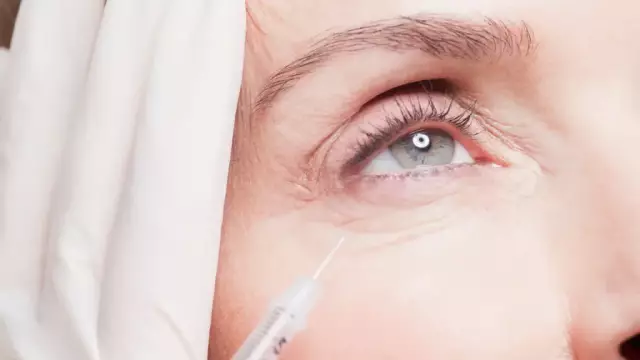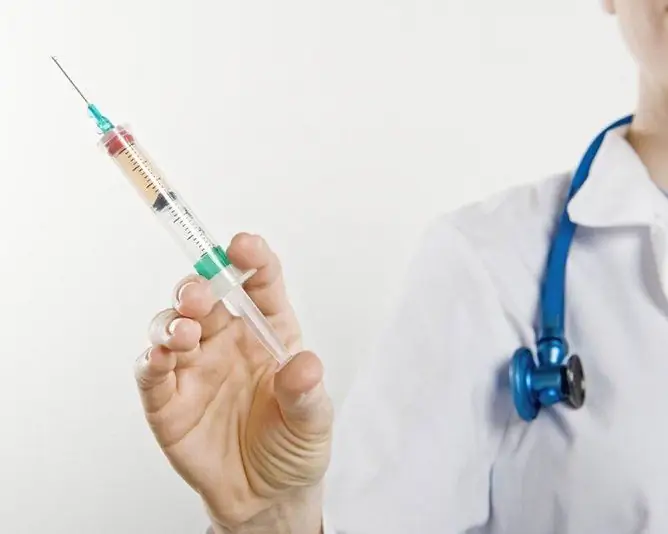- Author Rachel Wainwright wainwright@abchealthonline.com.
- Public 2023-12-15 07:39.
- Last modified 2025-11-02 20:14.
Veldeksal
Veldeksal: instructions for use and reviews
- 1. Release form and composition
- 2. Pharmacological properties
- 3. Indications for use
- 4. Contraindications
- 5. Method of application and dosage
- 6. Side effects
- 7. Overdose
- 8. Special instructions
- 9. Application during pregnancy and lactation
- 10. Use in childhood
- 11. In case of impaired renal function
- 12. For violations of liver function
- 13. Use in the elderly
- 14. Drug interactions
- 15. Analogs
- 16. Terms and conditions of storage
- 17. Terms of dispensing from pharmacies
- 18. Reviews
- 19. Price in pharmacies
Latin name: Veldexal
ATX code: M01AE17
Active ingredient: dexketoprofen (Dexketoprofen)
Manufacturer: OOO Velpharm (Russia)
Description and photo update: 2020-04-07
Prices in pharmacies: from 187 rubles.
Buy

Veldexal is a non-steroidal anti-inflammatory drug (NSAID) that has anti-inflammatory, antipyretic and analgesic effects.
Release form and composition
The drug is produced in the form of a solution for intravenous (i / v) and intramuscular (i / m) administration: a clear, colorless liquid with a characteristic smell of alcohol [2 ml each in dark glass ampoules (including with a notch and a dot or break ring), 5 ampoules in blisters, in a cardboard box, instructions for use of Veldexal, 1 or 2 packs complete with or without ampoule scarifier].
1 ml of solution contains:
- active substance: dexketoprofen trometamol - 39.6 mg, which is equivalent to 25 mg of dexketoprofen;
- auxiliary components: ethyl alcohol 95% (ethanol), 1 M sodium hydroxide solution, sodium chloride, water for injection.
Pharmacological properties
Pharmacodynamics
Veldeksal - NSAIDs, has analgesic, anti-inflammatory and antipyretic effects. Its active ingredient, dexketoprofen trometamol, is a propionic acid derivative. The mechanism of action of Veldexal is due to the property of dexketoprofen to inhibit the synthesis of prostaglandins at the level of cyclooxygenase-1 and cyclooxygenase-2.
After parenteral administration at a dose of 50 mg, the analgesic effect occurs in 0.5 hours and lasts 4-8 hours.
The use of dexketoprofen in combination therapy with opioid analgesics significantly (up to 30-45%) reduces the need for opioids.
Pharmacokinetics
After i / m administration, the maximum concentration (C max) of dexketoprofen in the blood serum is reached on average after 1/3 h. After a single dose of 25-50 mg, the area under the concentration-time curve (AUC) is proportional to the dose at i / m and in / in the introduction.
There is no cumulation of Veldeksal.
Plasma protein binding - 99%.
The volume of distribution (V d) averages 0.25 l / kg, the half- distribution time is approximately 1/3 hour.
It is metabolized mainly by conjugation with glucuronic acid.
The half-life (T 1/2) is from 1 to 2.7 hours. Excretion occurs mainly through the kidneys in the form of metabolites.
In elderly patients, the duration of T 1/2 after a single and repeated intramuscular or intravenous administration increases by an average of 48%, the total clearance of Veldexal decreases.
Indications for use
The use of Veldexal is indicated for symptomatic therapy in order to reduce pain and inflammation at the time of use for the following diseases and conditions:
- pains of various origins, including pain after surgery, post-traumatic and toothache, pain in bone metastases, renal colic, radiculitis, neuralgia, sciatica, algodismenorrhea - to relieve pain;
- acute and chronic inflammatory, inflammatory-degenerative and metabolic diseases of the musculoskeletal system, including osteoarthritis, rheumatoid arthritis, spondyloarthritis (ankylosing spondylitis, reactive arthritis, psoriatic arthritis).
Veldeksal does not affect the progression of the disease.
Contraindications
Absolute:
- complete or incomplete combination of bronchial asthma, recurrent polyposis of the nose and paranasal sinuses, and intolerance to NSAIDs and acetylsalicylic acid (including history);
- severe liver dysfunction (10-15 points on the Child-Pugh scale);
- period of exacerbation of inflammatory bowel diseases (Crohn's disease, ulcerative colitis);
- erosive and ulcerative lesions of the gastrointestinal tract and duodenum;
- a history of gastrointestinal bleeding, other active bleeding (including suspected intracranial bleeding);
- simultaneous anticoagulant therapy;
- confirmed hyperkalemia;
- severe renal dysfunction with creatinine clearance (CC) less than 30 ml / min;
- progressive kidney disease;
- period after coronary artery bypass grafting;
- decompensated heart failure;
- blood clotting disorders (including hemophilia);
- the period of pregnancy and breastfeeding;
- age up to 18 years;
- hypersensitivity to other NSAIDs or components of Veldexal.
Neuraxial (intrathecal, epidural, intrathecal) administration of the solution is contraindicated!
With caution, Veldexal injections should be prescribed for hepatic porphyria, liver disease in history, Crohn's disease, gastric ulcer and duodenal ulcer, ulcerative colitis, alcoholism, chronic heart failure I - II functional class according to NYHA (New York Heart Association), ischemic disease heart disease, peripheral arterial diseases, arterial hypertension, cerebrovascular pathologies, chronic renal failure (CC 30-60 ml / min), dyslipidemia or hyperlipidemia, diabetes mellitus, bronchial asthma, Helicobacter pylori infection, hematopoietic disorders, systemic connective tissue diseases (including systemic red lupus), smoking, tuberculosis, severe osteoporosis, severe somatic diseases, a history of allergies,a clinically significant decrease in the volume of circulating blood (including condition after surgery); over the age of 65 (including patients taking diuretics, patients in a weakened state or with a low body mass index); with concomitant therapy with prednisolone and other glucocorticosteroids (GCS), antiplatelet agents (including clopidogrel, acetylsalicylic acid), selective serotonin reuptake inhibitors (including fluoxetine, paroxetine, citalopram, sertraline), with long-term NSAID therapy.acetylsalicylic acid), selective serotonin reuptake inhibitors (including fluoxetine, paroxetine, citalopram, sertraline), with long-term NSAID therapy.acetylsalicylic acid), selective serotonin reuptake inhibitors (including fluoxetine, paroxetine, citalopram, sertraline), with long-term NSAID therapy.
Veldeksal, instructions for use: method and dosage
The prepared Veldexal solution is injected intravenously (slowly, at least 15 s) or drip (intravenous infusion lasting 1 / 6-1 / 2 h), as well as intramuscularly (slowly, deeply).
The solution for intravenous infusion is prepared under aseptic conditions, protecting it from exposure to daylight. The contents of one ampoule (2 ml) are mixed with 30-100 ml of 0.9% sodium chloride solution, glucose solution or Ringer's solution. The resulting solution should be colorless and have a transparent structure.
Recommended dosage: 50 mg 2-3 times a day at regular intervals. The duration of the course is no more than 2 days, the drug is indicated only during the period of acute pain syndrome. The maximum daily dose is 150 mg.
If necessary, re-introduction of Veldexal is allowed, observing a 6-hour interval.
With mild and moderate liver dysfunction (5-9 points on the Child-Pugh scale), the maximum daily dose is 50 mg, treatment must be accompanied by careful monitoring of liver function indicators.
In case of impaired renal function with CC 30-60 ml / min, the daily dose of Veldexal should not exceed 50 mg.
For elderly patients with normal liver and kidney function, dose adjustment is not required.
Side effects
- from the central nervous system: infrequently (≥ 0.1% and <1%) - insomnia, drowsiness, headache, dizziness; rarely (≥ 0.01% and <0.1%) - paresthesia;
- on the part of the hematopoietic organs: rarely - anemia; extremely rare (<0.01%) - thrombocytopenia, neutropenia;
- on the part of the cardiovascular system: infrequently - hyperemia of the skin, a feeling of heat, arterial hypotension; rarely - peripheral edema, arterial hypertension, tachycardia, extrasystole, superficial thrombophlebitis;
- from the urinary system: rarely - renal colic, polyuria; extremely rare - nephrotic syndrome or nephritis;
- from the side of metabolism: rarely - hypertriglyceridemia, hyperglycemia, hypoglycemia;
- on the part of the musculoskeletal system: rarely - muscle spasm, difficult movement of the joints;
- from the digestive system: often (≥ 1% and <10%) - nausea, vomiting; infrequently - dry mouth, dyspepsia, abdominal pain, hematemesis, diarrhea or constipation; rarely - anorexia, erosive and ulcerative lesions of the gastrointestinal tract (including bleeding and perforation), jaundice, increased activity of liver enzymes; extremely rare - damage to the pancreas and / or liver;
- from the respiratory system: rarely - bradypnea; extremely rare - dyspnea, bronchospasm;
- from the senses: infrequently - blurred vision; rarely - tinnitus;
- from the reproductive system: rarely - menstrual irregularities, dysfunction of the prostate gland;
- dermatological reactions: infrequently - sweating, dermatitis, rash; rarely - urticaria, acne; extremely rare - photosensitivity, allergic dermatitis, Stevens-Johnson syndrome, Lyell's syndrome, angioedema;
- laboratory parameters: rarely - proteinuria, ketonuria;
- local reactions: often - pain at the injection site; infrequently - an inflammatory reaction, hemorrhages and / or hematoma at the injection site;
- others: infrequently - feeling tired, chills; rarely - fever, back pain, fainting, agranulocytosis, bone marrow hypoplasia; extremely rare - facial edema, anaphylactic shock; with an unspecified frequency (there is no possibility on the basis of available data to establish the frequency of occurrence of adverse reactions) - aseptic meningitis (mainly with systemic lupus erythematosus or mixed connective tissue diseases), purpura, aplastic or hemolytic anemia.
Overdose
Symptoms: drowsiness, disorientation, abdominal pain, nausea, vomiting, dizziness, headache, anorexia.
Treatment: the appointment of symptomatic therapy. In severe cases, the use of hemodialysis is indicated.
special instructions
If gastrointestinal bleeding occurs, the administration of dexketoprofen should be stopped immediately.
It should be borne in mind that against the background of the use of Veldexal, the concentration of creatinine and nitrogen in the blood plasma, the risk of developing interstitial nephritis, glomerulonephritis, nephrotic syndrome, papillary necrosis or acute renal failure may increase. In addition, the likelihood of a transient increase in some liver function tests, a significant increase in the activity of alanine aminotransferase (ALT) and aspartate aminotransferase (AST) in blood serum increases. For this reason, during the period of treatment, careful monitoring of liver and kidney function is required, especially in elderly patients. If there is a significant increase in the corresponding indicators, dexketoprofen should be canceled.
Due to the fact that Veldeksal can mask the symptoms of infectious diseases, careful medical supervision is required during treatment. If the patient's condition worsens or signs of a bacterial infection appear, appropriate studies should be carried out.
It is recommended to use Veldeksal with extreme caution in patients with impaired renal, liver, heart function or the presence of a condition that can cause fluid retention in the body. This is due to the fact that the use of NSAIDs in this category of patients can contribute to the aggravation of the condition and fluid retention in the body.
In patients prone to hypovolemia, dexketoprofen increases the risk of nephrotoxicity.
One ampoule of Veldexal contains 200 mg of ethanol.
Influence on the ability to drive vehicles and complex mechanisms
During the period of treatment with Veldeksal, caution should be exercised when driving vehicles and engaging in other potentially hazardous activities that are associated with increased attention and speed of psychomotor reactions, since the drug can cause dizziness and / or drowsiness.
Application during pregnancy and lactation
The use of Veldexal is contraindicated during the period of gestation and breastfeeding.
Pediatric use
The appointment of Veldexal injections to children under the age of 18 is contraindicated due to the lack of information on the safety and efficacy of this NSAID in pediatric patients.
With impaired renal function
The use of Veldexal is contraindicated in severe renal dysfunction (CC less than 30 ml / min) or progressive kidney disease.
The drug should be prescribed with caution in patients with chronic renal failure (CC 30-60 ml / min).
The maximum daily dose of Veldexal in case of impaired renal function with CC 30-60 ml / min is 50 mg.
For violations of liver function
The use of Veldexal is contraindicated in severe liver dysfunction (10-15 points on the Child-Pugh scale).
The drug should be prescribed with caution to patients with a history of liver disease or hepatic porphyria.
Treatment of patients with mild to moderate liver dysfunction (5-9 points on the Child-Pugh scale) must be accompanied by careful monitoring of liver function. The maximum daily dose of Veldexal for this category of patients should not exceed 50 mg.
Use in the elderly
When prescribing Veldexal to elderly people, care should be taken due to the fact that this category of patients has an increased likelihood of age-related disorders of the kidneys, liver or cardiovascular system, as well as the occurrence of gastrointestinal bleeding or intestinal perforation.
In the normal state of liver and kidney function, dose adjustment in elderly patients is not required.
Drug interactions
- other NSAIDs [including high (more than 3 g per day) doses of salicylates], oral anticoagulants, heparin (in doses exceeding prophylactic ones), ticlopidine, GCS: a combination with each of the listed agents is undesirable due to an increased risk of damage to the mucous membrane of the digestive tract, the occurrence of ulcers and gastrointestinal bleeding;
- lithium preparations: when taken simultaneously with Veldeksal, an increase in the concentration of lithium in the blood plasma occurs, due to a decrease in its renal excretion, up to a toxic level. It is recommended to avoid the combination of lithium and NSAIDs. If this cannot be done, then it is necessary to ensure careful monitoring of the level of lithium in the patient's blood both when prescribing and changing the dose, and when canceling dexketoprofen;
- methotrexate: the combination with methotrexate at a dose of at least 15 mg every 7 days increases its toxicity, so such combinations should not be used. A combination with methotrexate at a dose of less than 15 mg in 7 days is allowed, but due to the increased hematological toxicity of methotrexate, treatment must be accompanied by monitoring the blood picture and renal function, especially in the elderly;
- hydantoin derivatives, sulfonamides: a possible increase in the severity of the toxic effects of each of these agents should be taken into account;
- diuretics, angiotensin-converting enzyme inhibitors: when combined with dexketoprofen, the effect of diuretics and other antihypertensive drugs is weakened; a study of renal function is required before prescribing, adherence to adequate hydration of the patient during the period of treatment. Diuretics increase the risk of nephrotoxicity;
- pentoxifylline: the likelihood of bleeding increases; clinical monitoring of bleeding time or blood clotting time is necessary;
- zidovudine: against the background of concomitant therapy with zidovudine, long-term use of Veldexal can lead to the development of severe anemia, therefore, after 7-14 days of combined treatment, it is necessary to count blood cells and reticulocytes;
- oral hypoglycemic drugs: may increase their hypoglycemic effect;
- low molecular weight heparins: increase the risk of bleeding;
- beta blockers: may decrease their antihypertensive effect;
- cyclosporine, tacrolimus: these agents can increase nephrotoxicity, therefore, if it is necessary to use this combination, it is recommended to monitor kidney function;
- thrombolytics: concomitant thrombolytic therapy increases the risk of bleeding;
- probenecid: the combination with probenecid can increase the level of dexketoprofen in the blood plasma, which will require a dose adjustment of the latter;
- cardiac glycosides: the risk of an increase in their level of concentration in blood plasma increases;
- mifepristone: a clinically significant decrease in its effectiveness is possible, therefore, Veldexal can be prescribed no earlier than 8-12 days after the end of mifepristone intake;
- quinolone antibiotics: the combination of dexketoprofen with high doses of quinolones increases the risk of seizures.
Dexketoprofen is pharmaceutically incompatible with a solution of dopamine, pentazocine, promethazine, pethidine or hydroxyzine, therefore mixing them in the same syringe is contraindicated.
The combination of Veldexal with pentazocine or promethazine in a solution for intravenous drip is not allowed.
Veldexal can be mixed with a solution of heparin, morphine, lidocaine, theophylline.
Diluted dexketoprofen is compatible with injection solutions for drugs such as dopamine, heparin, hydroxyzine, lidocaine, theophylline, morphine, and pethidine.
Analogs
Analogs of Veldexal are Dexketoprofen, Dexketoprofen KERN PHARMA, Dexketoprofen-SZ, Dexketoprofen LEKAS, Dexalgin, Dexalgin 25, Dexonal, Ketodexal, MORSADEX, Flamadex, etc.
Terms and conditions of storage
Keep out of the reach of children.
Store at temperatures up to 25 ° C in a dark place.
Shelf life is 2 years.
Terms of dispensing from pharmacies
Dispensed by prescription.
Reviews about Veldeksal
Reviews about Veldeksal are extremely rare, but they are positive. The drug is characterized as effective, superior to similar drugs with a similar spectrum of action.
Veldeksal did not receive any negative evaluations from patients.
The price of Veldeksal in pharmacies
The price of Veldeksal for a package containing 5 ampoules can range from 221 rubles.
Veldeksal: prices in online pharmacies
|
Drug name Price Pharmacy |
|
Veldeksal solution for intravenous and intramuscular administration 25 mg / ml 2ml 5 pcs 187 r Buy |

Maria Kulkes Medical journalist About the author
Education: First Moscow State Medical University named after I. M. Sechenov, specialty "General Medicine".
Information about the drug is generalized, provided for informational purposes only and does not replace the official instructions. Self-medication is hazardous to health!






